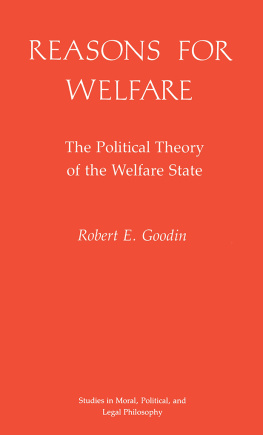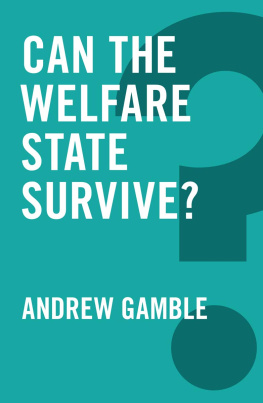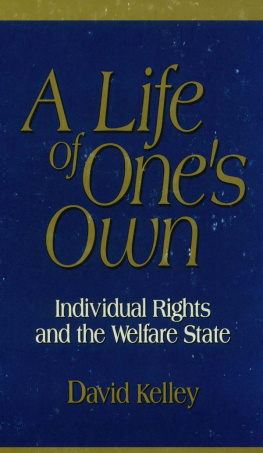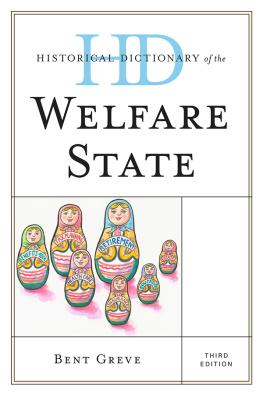REASONS FOR WELFARE
STUDIES IN MORAL, POLITICAL,
AND LEGAL PHILOSOPHY
General Editor: Marshall Cohen
REASONS FOR
WELFARE
The Political Theory
of the Welfare State
Robert E. Goodin
PRINCETON UNIVERSITY PRESS
PRINCETON, NEW JERSEY
Copyright 1988 by Princeton University Press
Published by Princeton University Press
41 William Street
Princeton, New Jersey 08540
In the United Kingdom:
Princeton University Press, Chichester, West Sussex
All Rights Reserved
Library of Congress Cataloging-in-Publication Data
Goodin, Robert E. Reasons for welfare.
(Studies in moral, political, and legal philosophy)
Bibliography: p. Includes index.
1. Social justice. 2. Welfare stateMoral and ethical aspects.
I. Title. II. Series.
HM216.G564 1988 303.372 88-5822 ISBN 0-691-07766-5 (hbk.)
ISBN 0-691-02279-8 (pbk.)
eISBN: 978-0-691-22187-8
R0
If one examines the two major ideological currents that have come down to us from the Enlightenment, liberalism and socialism, one finds that neither of them expresses any great yearning for social welfare policyscarcely even so much, in fact, as the more patriarchical and religiously-tinged variants of the old feudal ideology of social estates and their duties.
Gunnar Myrdal
CONTENTS
ix
xiii
PREFACE
The central aim of this book is normative rather than empirical. It is concerned not with the causes but with the reasons that can be offered for the welfare state. The two are not necessarily unconnected, of course. Sometimes people are moved by ethical arguments. Circumstances sometimes succeed in making abstract arguments personally compelling. Far from denying these truths, I actually take considerable comfort in them. They are what gives political philosophy some practical point.
Still, while such happy outcomes are always possible, they are never inevitable. It would be dangerously wrong to suppose that all welfare states now in existence have been brought into existence for good reasons. Motives are characteristically mixed, and often bad. It would be folly to pretend otherwise.
So too would it be dangerously misleading to suggest that good arguments alone will suffice to bring a welfare state into existence or to protect one already in existence from those who would dismantle it. Moral philosophy, I am firmly convinced, is one form of political action. It is not the only one, however; and perhaps, pragmatically, it is not even the most important one. Various other forms of political activity will surely be required if we are to succeed in discharging what I hope to show are our clear moral duties to protect vulnerable and dependent members of our society from exploitation.
The phrasing of this books title is positive, promising to offer reasons for welfare. It is in the nature of such a crowded field, however, that nothing much positive can be accomplished without first clearing away a fair bit of underbrush on either side. The bulk of this book is, therefore, given over to largely destructive exercises.
My principal aim is to show that there are good reasons for us to favor an activist state promoting the social welfare of its citizens. But in the course of making that argument, I shall also be obliged to show that the New Right is wrong in thinking otherwise, and that the Old Left is wrong in thinking that the most fundamental reason for the most basic form of welfare state can be found in any of the standard justifications traditionally offered in defense of social welfare policies.
Between them, the concepts of need, equality, and community pretty well exhaust the catalogue of conventional Old Left justifications for the welfare state. None of them will suffice. On closer inspection, it turns out that we have no good, clearcut reason to give the task of meeting needs per se systematic priority over merely satisfying desires. On closer inspection, it turns out that our commitment to equality per se, and for its own sake, is substantially weaker than we have long supposed. On closer inspection, it turns out that communitarian ideals lead us to enhance individual welfare only incidentally, if at all.
Each of those considerations points in the direction of a principle which, suitably reformulated, might have considerable moral force. Each of those principles might bear tangentially on questions of the justifiability of the existence of the welfare state. Each of them might even bear centrally on questions of the justifiability of the expansion of welfare-state programs, once they are in place. None of those principles itself provides the central justification for the existence of basic welfare-state institutions, however. Demonstrating the failure of all the standard Old Left arguments in this regard is the burden of of this book.
To say that none of the standard justifications of the welfare state will suffice is not to say that the welfare state is without justification. It is merely to say that its justification must be sought elsewhere, in less conventional arguments. The one that I favor is couched in terms of the moral duties of the strong to protect the weak. I hesitate to call this a new justification. In a way, it is nothing more than noblesse oblige in modern guise; and in certain respects, its central tenets are already fairly well established in the practical political history and the rhetoric of the welfare state itself. When formally discussing the ethical foundations of the welfare state, however, both politicians and scholars alike tend to leave this crucial premise suppressed. It is my intention to put that premise at the center of the argument, where it belongs.
I shall say relatively little about the deeper philosophical arguments for the general proposition that we have a strong moral duty to protect those whose interests are particularly vulnerable to our actions and choices. I have argued for that more general proposition at some length in a companion volume, Protecting the Vulnerable (Chicago: University of Chicago Press, 1985). Those looking for philosophical foundations should search there. Here I shall confine myself principally to tracing the implications of that general proposition for the welfare state.
The essential function of the welfare state thus construed is to prevent the exploitation of vulnerable members of society. Put more positively, it is to protect the interests of those who are not in a position to protect them themselves. Tracing out the implications of such arguments is the business of .
This analysis of the true moral foundations of the basic institutions of the welfare state lays the necessary groundwork for rebutting various attacks upon it mounted by the New Right. Those attacks are many and varied. But whether they are couched in terms of efficiency, desert, self-reliance, freedom, or supply-side logic, all those arguments eventually founder in one way or another on the ethical foundations laid in .
Taken together, the various arguments and counterarguments of this book leave the welfare states basic institutions safe against the onslaught of the New Right, without forcing it to fall back on the familiar arguments of the Old Left. The ethical foundations here revealed are, in my view, firmer foundations for the basic institutions of the welfare state than those on which they have for too long been forced to rely.
Wivenhoe, Essex
March 1987
ACKNOWLEDGMENTS
This book represents the culmination of my work with the Social Justice Project of the Research School of Social Sciences at the Australian National University, to which I was attached between 1982 and 1984. Some of the material in these chapters was written in anticipation of going there; much of it was written, or at least sketched out, while I was working there. My first and largest debt is therefore to my colleagues in that project (especially its director, Pat Troy, and its secretary, Norma Chin) and in the school more generally for their generous support, material and otherwise.













